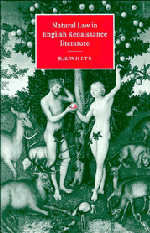Book contents
- Frontmatter
- Contents
- Preface
- Acknowledgments
- 1 Natural Law in history and Renaissance literature
- 2 The heritage of classical Natural Law
- 3 The reception of Natural Law in Renaissance England
- 4 Law and literature in sixteenth-century England
- 5 More's Utopia
- 6 ‘Love is the fulfilling of the law’: Arcadia and Love's Labour's Lost
- 7 ‘Hot temper leaps o'er a cold decree’: The Merchant of Venice and Measure for Measure
- 8 Shakespeare's The History of King Lear
- 9 Milton and Natural Law
- Epilogue: Hobbes and the Demise of classical Natural Law
- Appendix: Aquinas on the right to own private property
- Notes
- Select bibliography
- Index
1 - Natural Law in history and Renaissance literature
Published online by Cambridge University Press: 17 September 2009
- Frontmatter
- Contents
- Preface
- Acknowledgments
- 1 Natural Law in history and Renaissance literature
- 2 The heritage of classical Natural Law
- 3 The reception of Natural Law in Renaissance England
- 4 Law and literature in sixteenth-century England
- 5 More's Utopia
- 6 ‘Love is the fulfilling of the law’: Arcadia and Love's Labour's Lost
- 7 ‘Hot temper leaps o'er a cold decree’: The Merchant of Venice and Measure for Measure
- 8 Shakespeare's The History of King Lear
- 9 Milton and Natural Law
- Epilogue: Hobbes and the Demise of classical Natural Law
- Appendix: Aquinas on the right to own private property
- Notes
- Select bibliography
- Index
Summary
I am tempted to think that only a saint could properly write this book, but only a fool would make the attempt. It explores the literary traces of an idea which, in some form or another, has struck every human society from antiquity onwards as fundamental, an idea which is breathtakingly simple and said to be innate to human beings, but at the same time is considered to be ambiguous, variable, and situational in the ways in which it is applied. A modern dictionary of terms used in English Law defines Natural Law as ‘rules derived from God, reason or nature, as distinct from man-made law’, and Law of Nature as ‘certain rules of conduct supposed to be so just that they are binding upon all mankind’. Behind these bland words lies a world of doubt, centuries of dispute, the English Civil War of the seventeenth century and the American Civil War of the eighteenth, the abolition of slavery, the Nuremberg Trials, and other great upheavals of history. At the heart of the concept lies a belief that survival of the species is a fundamental instinct to human beings. The theory has been around for at least 2,500 years, at its zenith in England in the Renaissance, and now, at the end of the twentieth century, it is rising again into ascendancy, generally in a related but significantly different guise of ‘natural rights’ or ‘human rights’ (ius naturale) rather than ‘Natural Law’ (lex naturae), or appearing in borrowed robes of eastern mysticism (which is another story altogether).
- Type
- Chapter
- Information
- Natural Law in English Renaissance Literature , pp. 1 - 20Publisher: Cambridge University PressPrint publication year: 1996



